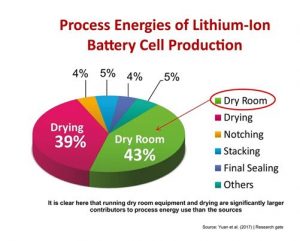
Considering that Li-ion batteries are at the heart of the EV ecosystem, the industry should focus on improving battery management; aimed at extending battery life, enhancing safety, and boosting charging capability. Li-ion batteries are responsible for powering the EVs, contributing to the unrivaled performance of the vehicles, writes Dr. Vijay Chaudhry, President, Bry-Air.
![]()
The Indian EV market is progressing at a rapid rate and is poised to reach a USD 100 billion market by 2030. Given to the efforts being made to expedite the adoption of EVs, the country has emerged as one of the fastest-growing EV markets across the globe. Clocking a phenomenal surge of 1.67 million unit annual EV sales, the country stays true to its commitment of becoming a net-zero country by 2070.
Though the country has been projecting satisfactory growth trends, in order to achieve the aspirational goal, it is the need of the hour to accelerate EV adoption while driving its deeper penetration in the market. Understanding that advancement in battery technology and elevating user experience are the essential factors giving the desired impetus to the EV market, efforts towards responsible battery management can bolster the EV prospects in India.
Considering that Li-ion batteries are at the heart of the EV ecosystem, the industry should focus on improving battery management; aimed at extending battery life, enhancing safety, and boosting charging capability. Li-ion batteries are responsible for powering the EVs, contributing to the unrivaled performance of the vehicles. At the same time, Li-ion batteries come with the benefit of high energy efficiency and exceptional performance even at high temperatures. Projecting a better storage density and the ability to charge and discharge safely makes it the ideal option for optimizing the performance of the EVs.
Therefore, to unlock the unrealized potential of the EV industry, innovating in battery technology comes in handy for ensuring customer satisfaction. In the process, it also plays a crucial role in alleviating any safety concerns that pose a significant challenge to the expansion of the industry. The cases of accidents, such as explosions and EVs catching fire, etc., discourage potential buyers from purchasing the vehicle, and practicing battery management plays a crucial role in overcoming the challenge.

Gauging the importance of Li-ion batteries, the industry players should be cognizant of the highly hygroscopic nature of various materials used in a battery. The materials coming with the tendency to absorb moisture are responsible for the manufacturing of inferior quality and faulty batteries, giving rise to serious safety issues. As a result, it is recommended to manufacture Li-ion batteries in a highly controlled environment while exercising real-time monitoring. Installing Dry Rooms to achieve the strict environmental conditions helps in maintaining humidity levels within a narrow range throughout the manufacturing and assembly of battery cells. Dry Rooms empower the processing of hygroscopic and moisture-sensitive materials by achieving extremely low dew points between -40°C to -80 °C.
However, the processes involving Li-ion battery cell manufacturing in Dry Rooms are major energy guzzlers, which eventually translate to high production costs. To tackle the problem, employing highly efficient Low Dew Point technology can optimize entire battery cell manufacturing in the most energy-efficient way. By significantly reducing the consumption of energy, the technology bodes well for the adoption of sustainable practices by the industry.
Therefore, in the pursuit of exercising battery management across the country, it is recommended to go for patented, internationally recognized technology that can efficiently achieve the specific environmental conditions for Li-ion battery manufacturing. The production of high-quality batteries can pave the way for a smooth transition to clean transportation and, likewise, a green future.